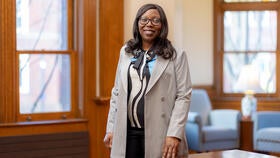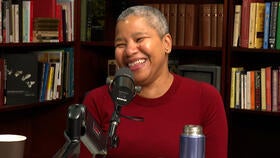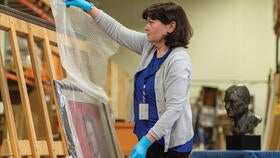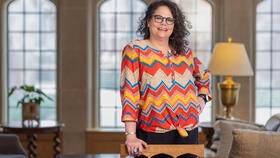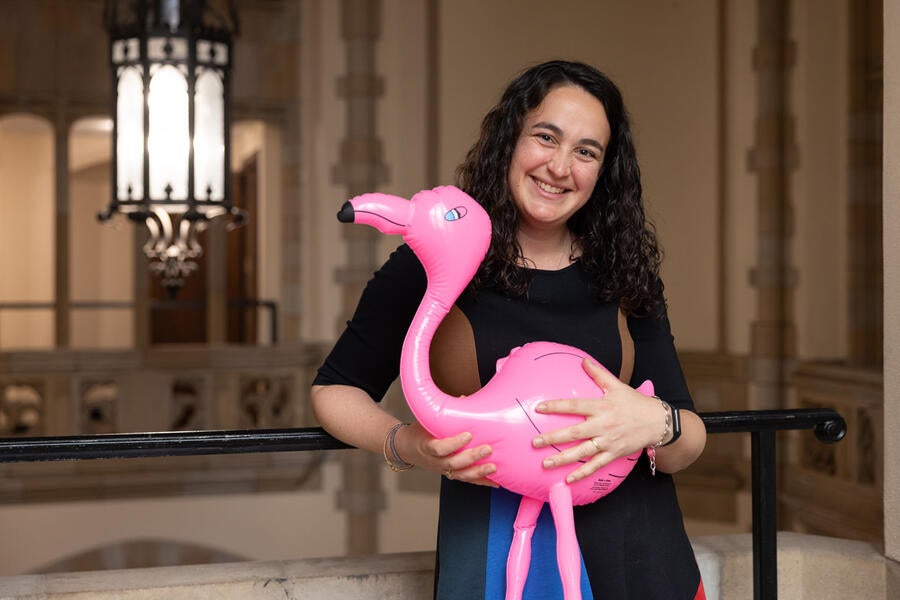
Meet Maytal Saltiel, the eighth University Chaplain and the first University Chaplain who is Jewish. She aspires to show that relationships and friendships across diverse communities are integral to what it means to be a human and live in today’s global community.
| Title | University Chaplain |
|---|---|
| Time in current position | 2 months |
| Started at Yale | 2013 |
How would you describe your current role?
University chaplains care for the soul of the university. It’s multi-faceted—we care for all our religious and spiritual groups on campus, but we also care for many people that don’t come from a spiritual tradition. We offer a space of radical welcome and hospitality, a place of warmth to explore big ideas and to wrestle with everything life throws at us.
There are several aspects to the role. There’s working with multi-religious groups and delivering pastoral care. We also help increase religious literacy and help people understand and learn how to ask questions of one another—humble questions so we can engage on campus and in this world that is increasingly complex.
What prepared you for this work?
Chat with a Chaplain
The Yale Chaplain's Office sponsors Chat with a Chaplain for the Yale community, including staff members. Chaplains are available to meet one-on-one with anyone who would like to talk, and appointments can be made by using the Chat with a Chaplain form during the academic year, by reaching out to one of the chaplains directly through email found on their staff bios, or by calling the office at (203) 432-1128.
I grew up in a strong Jewish community and family, mostly in upstate New York. The ideas of taking care of others, of caring for the stranger, of getting to know one’s neighbors were very important to our family, as was our Jewish identity. My grandfather was a Holocaust survivor. The other side of my family traces through to the Spanish Inquisition and experienced being expelled from one country after another. I think I saw firsthand what happens when people don’t understand or care for one another.
My family has always said I am a calming presence and have been since I was young. My parents like to tell the story of when I was five or six, and families would invite me over when their children were acting up because they wanted me to help calm them down. I think that part of my personality was called to this without even my knowing.
What has been your career path and training for your job at Yale?
I went to Johns Hopkins University to pursue a degree in international relations. I was interested in diplomacy and wanting to bring people together to talk about what is meaningful to them.
While there, I discovered I was not a politician, nor did I want to be one. I also discovered the Interfaith Center and university chaplaincy. Sharon Kugler was my university chaplain, and she became my mentor. These two discoveries changed my life as I realized I wanted to be present with people in their moments of pain and joy; to talk about who they were at the very core of their souls.
I majored in international relations and minored in psychology. Since I was also passionate about public education, I decided to spend a year doing Teach for America. I discovered I was not meant to be a classroom teacher, so I went back to Hopkins and worked for a year as a programming coordinator in the Interfaith Center to make sure that I did want to pursue chaplaincy. Following that, I ended up at Harvard Divinity School to get my master’s degree.
After graduating from divinity school, I spent a year working at Penn Hillel as the Repair-The-World coordinator. Repairing the world comes from the Jewish concept of “tikkun olam”. I worked with students around developing the Jewish value of service and working towards a just world. Then I moved to New Haven to work at Yale. I was associate chaplain for the last decade, and then stepped into the role of interim university chaplain last year.
What is your favorite part of working at Yale? And your proudest moment?
I love the people. I feel very lucky every day that I get to work with amazing people like my staff, students, and other colleagues around the university.
My proudest moment was during the pandemic. It was a very hard time, as we all remember, but I think it was during the spring of 2021 that things felt particularly rough. People were not doing well. I was taking a walk with a student from Zimbabwe, and we were trying to think about how to make the world a better place and provide a little bit of comfort, a little bit of joy.
We came upon the idea of pink flamingos. We ordered inflatable pink flamingos, blew them up, and put little name tags on them with our symbol that said “embrace” or “whimsy” or “take me with you!” We filled wagons with our pink birds and walked over to Old Campus and Cross Campus and put them out on benches and tables. At first people looked at us strangely, but slowly they began to take them.
There was such excitement that the next time we brought a wagonful of flamingos, people pounced. Somebody stopped the car in the middle of the street to ask for a pink flamingo. There was such excitement and love for the pink flamingos, what it meant to have a little bit of joy. People were walking to the Law School with pink flamingos under their arms and attending classes in front of Sterling with pink flamingos in tow. For weeks later, and occasionally to this day, I would see pink flamingos in windows, peeping out to greet me.
So much of my chaplaincy is about helping people understand that we are complex individuals in complex and difficult circumstances, yet we can still be joyful and human.
What professional challenges do you face?
There is so much grief and pain in the world right now. I think the challenge is to sit with one another in the grief and to be present to it. I don’t have all the answers, but people need someone to talk to and process with. People are looking for somebody to be present, to witness, to really hear what they are saying. I need to be able to be a container to hold people’s stories and people’s pain. I need to be able to see the divinity within the individual in front of me and respond with love and compassion.
What would you say to someone who is looking to have this kind of career?
To be very honest it is a very small field and there are not many openings, so it is a hard field to get into. Omer Bajwa, the Muslim chaplain, and I teach a class at the Divinity School that we inherited from Sharon Kugler, about models and methods of university chaplaincy. There are many parts to university chaplaincy, some of which you don’t realize until you’re in the job. I think having conversations with people who have been or are currently in the field is crucial.
But there are ways to be present with folks and to act as a chaplain no matter what your profession. We can all remind one another to embrace our full humanity, to hold one another’s pain, and to encourage thoughtful and humble questions.
How do you see your role connecting to Yale’s mission?
The university’s mission statement talks about educating aspiring leaders worldwide to serve all sectors of society. We talk a lot about servant leadership at Yale—about what it means to serve the people you’re leading. When we educate future leaders, part of that needs to be religious literacy. Future leaders must understand the intricacies of religious traditions and how they inform the people they are leading in both easy-to-notice and not-easy-to-notice ways. Our students need to feel supported as leaders and know what their resources are—to have an experience of being “held” in a tough situation and of “holding” others. Part of this is community care, which we’re trying to teach in the work that we do.
The second part of the mission statement talks about an ethical, interdependent, and diverse community, which is exactly what the chaplaincy is trying to foster through our interreligious chaplain’s office. Many of the people who walk in the door have different ethical frameworks than the person they’re talking to. We aspire to show that relationships and friendships across these diverse communities are integral to what it means to be a human today and live in the global community.



